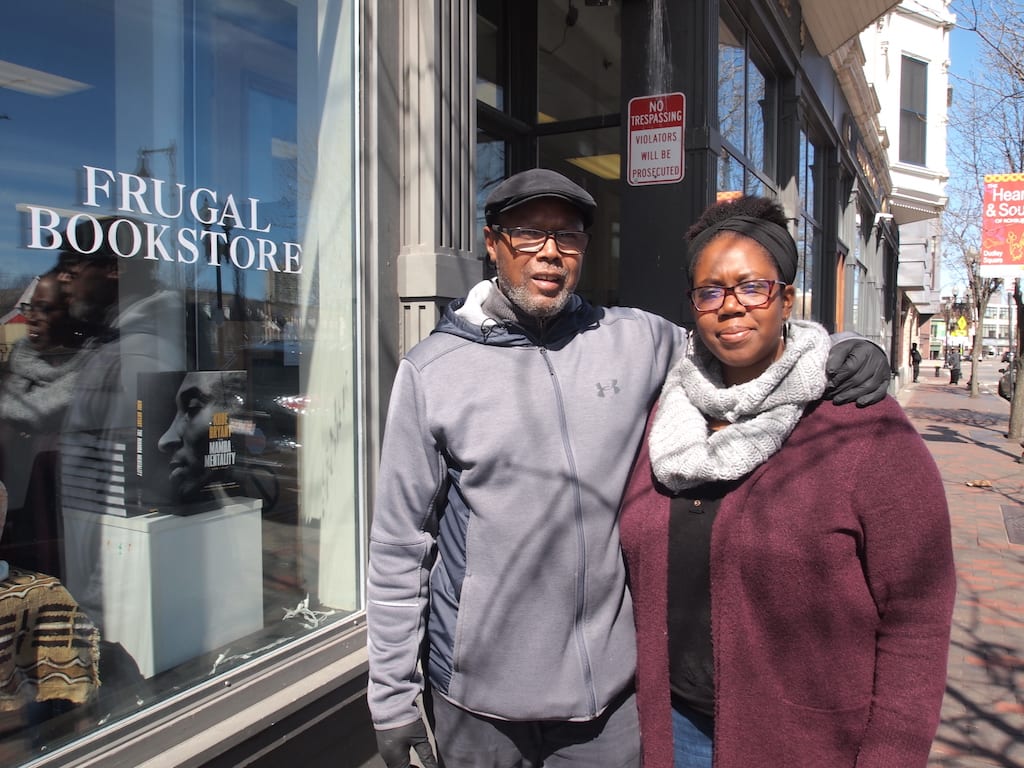
For barber Lanice Mikell, his business outlook is calculated one day at a time.
“We’re open now,” he said as he put the finishing touches on a customer’s close-cropped cut last Friday. “I don’t know how long we’re going to be open. Until they come and say we gotta stop.”
That order to stop came Monday, as Gov. Baker announced a ban on all non-essential businesses. Supermarkets and drug stores are to remain open. Barbershops will close, along with salons and non-food retail stores.” The order may bring low-income communities more in line with what had already taken hold in Boston’s wealthier neighborhoods.
Last week, downtown neighborhoods such as the Back Bay and the South End were largely bereft of commuter traffic and shoppers. But most businesses in Grove Hall were open on Friday, March 20 — nail shops, hair salons, takeout restaurants and liquor stores — and doing what seemed a healthy business volume.

The Grove Hall saw busy foot and car traffic Friday afternoon.
Banner photo
In many middle-class communities, the norms of social distancing were quickly adopted, with children staying in and friends greeting each other from a distance of at least six feet. But outside Blue Hill Barbers, where Mikell rents a chair, barbers on break congregated in close quarters on the sidewalk outside last Friday.
The message coming from federal, state and local elected officials is clear: social distancing is critical to stopping the spread of what is becoming the deadliest global pandemic in the last 100 years.
“Handshakes and hugs simply can’t be part of our daily routines,” Gov. Charlie Baker said during a daily news briefing Saturday.
But City Council President Kim Janey said that message hasn’t gotten to everyone, despite constant repetition in the news media.
Saturday, Janey joined city officials, city workers and volunteers who dropped information about the coronavirus at every doorstep across the city in English, Spanish, Chinese and other languages. The flyers included tips on washing hands and maintaining social distancing, web addresses and phone numbers for obtaining information and help, and a list of locations providing free emergency meals.
The common recommendation or order to “work from home” is not an option for everyone – and many workers doing essential jobs in health care and transportation rely on public transit. MBTA officials last week cut service to reflect lower ridership, but two days later restored full-time service to the Blue Line, which takes many low-income Latino workers from their homes in East Boston and Revere to their jobs downtown and at Logan Airport. Trolleys on the Green Line E branch, which serves the Longwood Medical Area, also were restored to regular service to help accommodate hospital workers.
While workers in many middle- and high-income professions are able to work from home, low-wage workers are facing unemployment. Contract workers, who are not employees, are facing weeks or possibly months without income.

Local clinics like Codman Square Health Center, are anticipating increased COVID-19 screenings.
Banner photo
Those with essential jobs, including the jobs in the transportation sector, still face daunting choices. For now, wheelchair attendant Ibtissem Lamli is still working at Logan Airport. But like many who can’t work from home, she’s deeply conflicted. The single mother of a teenage son with an auto-immune disorder, she fears she could pass the corona virus along to him.
“I need my job to support my son,” she said. “We live paycheck to paycheck. This is not a job I can do from home.”
Her son’s doctor told Lamli she shouldn’t work, but that’s not an option.
“I have only this job,” she says. “I have MassHealth. It’s the only way I am able to afford my son’s medical treatment.”
SEIU 32BJ Executive Vice President Roxana Rivera said hundreds of members of the service employees’ union who are airport workers have been laid off. Others are facing the same dilemma Lamli is struggling with. While airlines are seeking a portion of the $8 billion the Trump administration has promised for business bailouts, Rivera says the workers need help, too.
“We’re advocating at the federal level,” she said. “We want to make sure there’s resources coming to alleviate the burden for contracted airport workers.”
While Congress and the Trump administration are negotiating a $2 trillion economic relief package, it’s unclear how much funding will make it to low-wage workers, or when it will arrive.
Janey said many of her constituents in Roxbury are facing tough choices.
“This is a global pandemic,” she said. “Thousands and thousands of people have died all over the world. And many of us are deeply afraid of the economic impact that this is having. In a neighborhood where there’s a high concentration of poverty, many folks, particularly small business owners, feel as if they have to work because April first is just around the corner and rent is due.”
Working at his barber’s chair, rent was foremost on Mikell’s mind last week.
“The bills don’t stop,” he said. “The rent doesn’t stop. All this stuff has to be paid. We still have to eat.”







